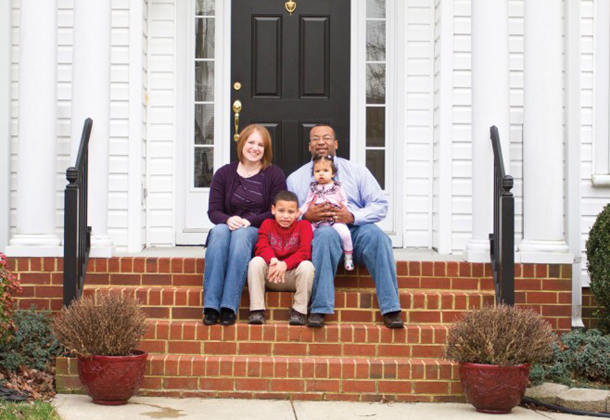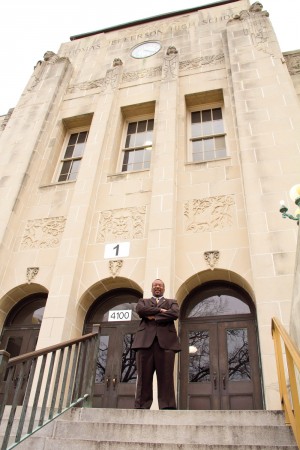
When Jay Johnson recalls his 20 years of coaching basketball at Thomas Jefferson High School in Richmond, Virginia, Cedric Moore Jr. ’99 stands out in his memory.
“The best teams I ever coached were the ones Cedric was on,” Johnson told Crossroads in January 2012. “Cedric was special. This guy played like a house on fire. One night he scored 36 points. He was a leader on a team that gave me their absolute best – we were always overmatched.”
At Thomas Jefferson High School, Cedric also was a stand-out baseball player (catcher) and football player (receiver, quarterback, defensive back). But basketball cleared his path to college.
Cedric says he never would have made it to college without Coach Johnson telling him he had to go, picking up the phone to call Tom Baker ’81 (then EMU’s basketball coach, assisted by current coach Kirby Dean ’92), and putting Cedric on a Greyhound bus to get to Harrisonburg the night before registration for class. Johnson even paid for the bus ticket.
“I knew it was a good academic environment,” Johnson said.
Cedric was reluctant to leave Richmond – nobody in his family had gone to college. Today, though, Cedric realizes Johnson was right: “I needed to get out of my neighborhood and go away from my buddies and distractions.”
The “distractions” included once being on a bus that was riddled with bullets by a member of the losing team, neighborhood drug dealers as models of the way to make a decent income, and seeing someone murdered right where he was playing pick-up basketball with his best friend, Monte Ellis.
At that time, Cedric also lacked a father figure in his home – his namesake, Cedric Moore Sr., was mostly absent from his life, having been divorced from Cedric’s mother when Cedric was 12 years old. Prior to that, when Cedric was a preschooler, his father had spent four years in prison.
Safety Through Athletics
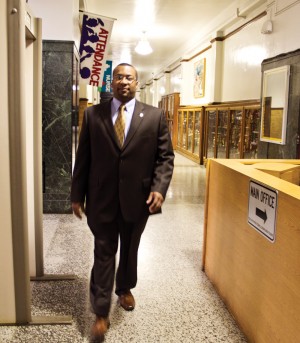
Cedric credits the Battery Park Athletic Association for keeping him, Monte, and some other close friends safe in their community of Northside, where the official crime rate remains high. This association has received national attention for its extraordinary efforts to educate youth and provide hope, says Cedric, adding “this is the same league where tennis-great Arthur Ashe Jr. learned and sharpened his skills as a youngster.”
“It was one of the most exceptional programs in the city,” recalls Monte. “We had lots of male mentors who stayed in our lives from middle school through high school. To this day, we can go to them and ask their advice.” Monte, who went to Virginia State for two years, now works in a law office.
Both Moore and Monte say that their neighborhood drug dealers actually watched out for them, warning them to stay in school, keep clean, and “get out of here.”
“They wanted us to achieve what they hadn’t,” says Cedric. “I know this isn’t the image people think of when you say drug dealer, but if it wasn’t for many of them looking after us, we may have been a statistic.” Despite the roughness of the neighborhood, many of the adults watched over the young like they were members of their own family, he adds.
Most of all, Cedric credits his mother, Susan Moore, and his grandmother, Shirley Roberts, for pushing him to do well.
Susan became enthusiastic about school for the first time when she was pregnant at age 16 with Cedric and received one-on-one assistance from teachers to complete her coursework.
She, in turn, pushed Cedric to excel academically. Playing games had to stop and homework start at a certain time each day. And if Cedric slipped as low as a “C” in any course, Susan took him off whatever sports team he was on until that grade rose.
Thanks to Grandmother
Cedric’s grandmother, called “Miss Shirley” by one and all, presided over a love-filled home with a small, one-hoop backyard court that as many as 20 kids clustered around when school was out, safe from whatever was happening elsewhere in the neighborhood.
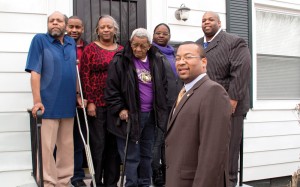
“My grandmother enforced rules for her back yard and fed many children when they had nothing to eat at home,” recalls Cedric. Both Cedric and his mother circle back in conversation to praise Miss Shirley for her unflagging support through hard times.
In January 2012, Cedric’s mother, father, grandmother, one brother (Shea), cousin, and best friend Monte gathered in the house of an aunt (Dometria Austin) to reminisce about Cedric. Whatever distance Cedric once felt with his father was gone. They spoke affectionately of each other, with Cedric Sr. suggesting that his son would make a good president of the United States.
“Everything changed for him when he went to Eastern Mennonite. He has become a big, big success,” said Cedric Sr.
Shea stressed, though, that Cedric Jr. had not let his success go to his head. “He really cares about us, about our family. Whenever I need help, he tries to give me good answers.”
Playing 1993-1996 as No. 22, Moore is listed in the EMU men’s basketball record book for career assists (210). He got through EMU on a combination of financial aid extended by EMU, government-backed loans, and work-study positions.
“Coach Baker was always there for his players, even when they didn’t display maturity,” Cedric says. “I was in his first recruiting class, and he had to play 11 freshmen, which took guts. We took bumps the first couple of years, but we made the conference tournament by my junior year.”
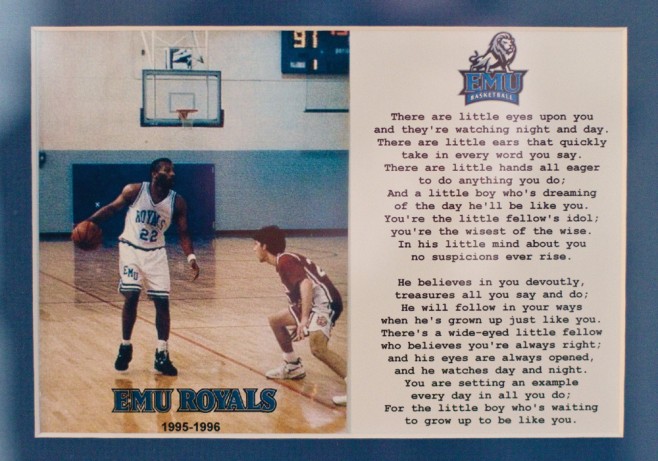
By 1999, Cedric had graduated as a social work major, returned to Richmond, and started rising through the ranks of his field. While managing a residential program for Virginia Home for Boys and Girls, he met the young woman he would eventually wed, Melinda Beresik.
Social Work to Grad School
While Melinda completed a PhD in psychology, Cedric earned an MBA. He is now working on a doctorate of strategic leadership through Regent University. In 2009, when Cedric was quality assurance coordinator for the Richmond Behavioral Health Authority, he was named to the Governor’s Advisory Board of Child Abuse and Neglect.
Sometime amid this busyness, Cedric and Melinda found time to get married, have two children – Brandon, now 6, and Caitlyn, 1 – and partner with clinical social worker Laura E. McDonald to start an organization that specializes in services for children with autism spectrum disorders. Cedric says Spectrum Transformation Group in Richmond, Va., is the first in Virginia to be licensed with an autism specialty by the Department of Behavioral Health and Developmental Services.
Cedric, Melinda and Laura received encouragement to launch Spectrum from Melinda’s former mentor at Virginia Commonwealth University, psychology professor Donald Oswald ’75. Oswald is one of the leading experts on autism in the mid-Atlantic region.
Since its founding in July 2010, Spectrum has grown from one staff member handling four cases to 11 staff members, including two psychologists, handling 25 cases, with a waiting list of prospective clients. Cedric no longer does social work himself. As chief executive officer, he hires people to deliver the services, such as former Royals volleyball player Colten New ’10, who was a psychology major.
Beyond helping autistic children, Cedric says he wants to lend a hand to aspiring leaders from backgrounds similar to his. It’s one way of repaying all the people who helped him along the way. Another way is serving on EMU’s Alumni Council.
None of this surprises Cedric’s old high school coach. “I always knew he was special,” said Jay Johnson.
